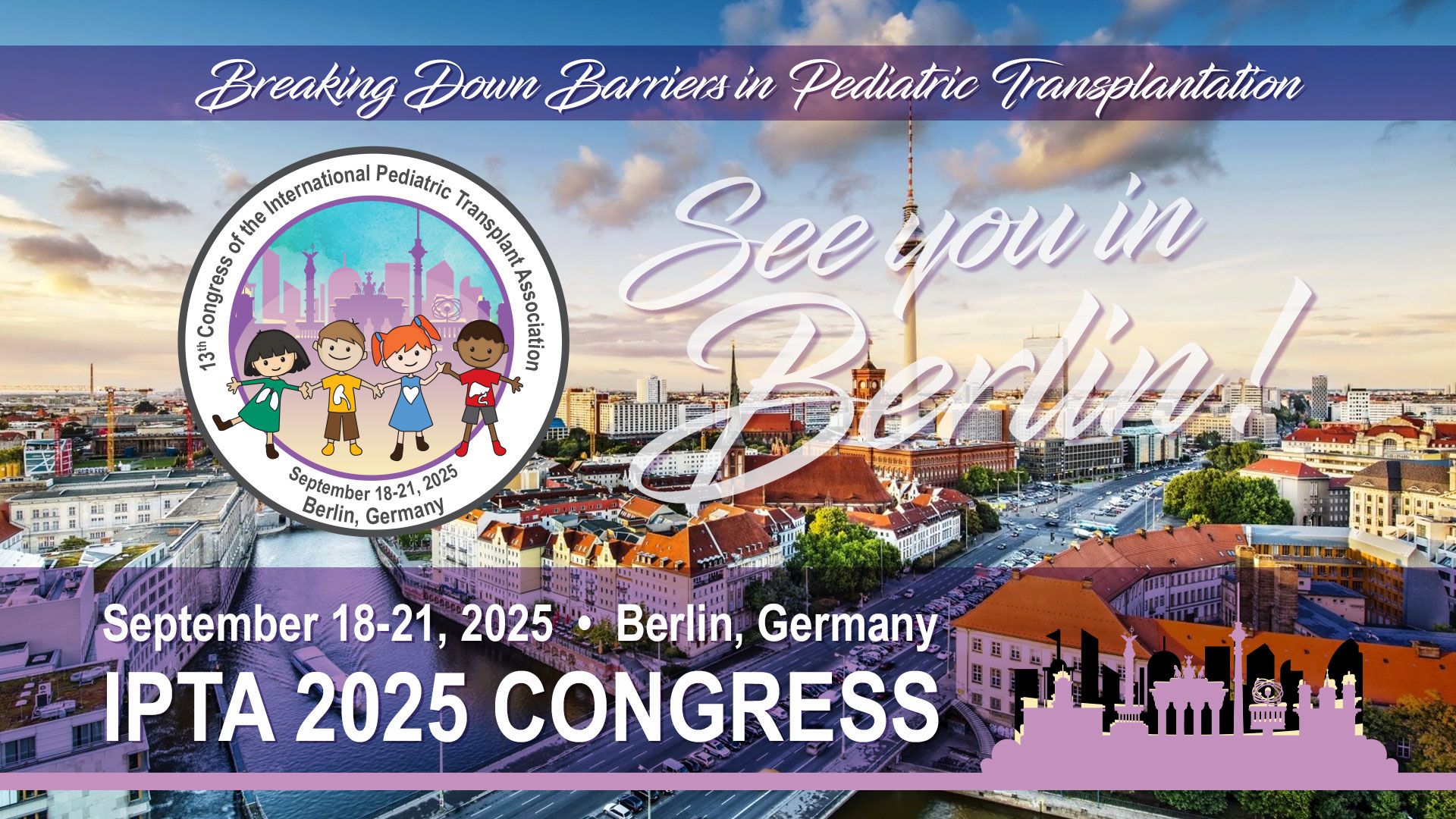- Research
- About
- News
- Journal
- Education
- Outreach
- Events
- Members Area
- IPTA Journal Club video (Requires login)
- 2025 IPTA Election
- Membership Directory
- View My Profile
- Edit My Profile
- My Memberships / Pay Dues
- Join IPTA
- Member Journal Access (Requires login)
- Catalogue of guidelines and position statements
- IPTA ListServ (Requires login)
- IPTA Fundraising
- IPTA Endorsement Forms
Member Login

Dear Colleagues,
On behalf of the International Pediatric Transplant Association, we invite you to participate in our 2025 Council Election.
To cast your ballot:- Log in into your account
- Prior to accessing the ballot you may view nominee statements and photos on this page.
- Click the button below and you will be taken to the election ballot.
Deadline to vote: Tuesday May 20, 2025
Thank you for being an active member of our Association. We look forward to sharing the results of our election during IPTA’s Awards & Business Meeting, on Saturday September 20th 2025, 14:15-15:35 in Berlin, Germany.
Visit www.ipta2025.org for more information. Hope to see you there!
Nominees
Thoracic (Running Unopposed)


Javier Castro - South America
The principle of solidarity is essential to organ transplantation; it highlights our collective responsibility to ensure equitable access to life-saving treatments for all patients, irrespective of their geographical and socio-economic circumstances. Sadly, this principle is often not realized, leaving vulnerable populations in middle-income countries at a considerable disadvantage. It is within IPTA's scope to address these disparities by continuation of the promotion of collaboration and enhancement of knowledge-sharing between member institutions in both high- and low-resource settings, like the successful outreach program.
As a physician with over a decade of experience in heart transplantation in a middle-income country, I am acutely aware of the challenges facing pediatric transplantation, especially in resource-limited environments. A significant issue is the disparity in access to organ transplantation services, worsened by current political and societal instability. This inequity jeopardizes the lives of countless children who urgently need heart transplants but lack the necessary medical infrastructure and resources.
By promoting educational initiatives and resource-sharing programs, IPTA can empower healthcare professionals and strengthen pediatric transplant centers in middle- and low-income countries. Supporting and expanding easy and affordable access to educational opportunities is crucial. As a council member, I would advocate for increased awareness of these challenges and work towards initiatives that reflect solidarity in pediatric transplantation. Together, we can promote that every child, regardless of their background, has the chance for a healthier and brighter future. I am committed to advance IPTA's mission contributing to meaningful changes in the field of pediatric transplantation.
Infectious Diseases (Running Unopposed)


Monica Ardura - North America
In my opinion, the loss of public trust in medical science may be one of the biggest challenges we face as a pediatric transplant community. The uncertainties of the evolving COVID-19 pandemic, compounded by media and politically charged drama and misinformation, further exacerbated and widened the gap in trust between the scientific medical community and the populations we have dedicated ourselves to serving. Although the pandemic has ended, distrust remains and continues to permeate our everyday practice in distinct forms from vaccine hesitancy to a growing amount of misinformation that cause additional barriers to timely and effective treatment or prevention strategies. More broadly this misinformation and distrust continue to threaten public health policy, ongoing research, and ultimately, the progress needed to improve access and outcomes for our pediatric transplant patients. This is tough. There is no one answer. Yet, the strength of this society is in its unified voice and steadfast mission of “promoting the science and practice of pediatric transplantation worldwide”. Together we must find more ways to continue to be the clear, transparent, and reliable source of evidence-based information for patients, families, colleagues, and policy makers. To effectively rebuild the trust we will have to also likely learn to communicate better: to really listen and find new/more effective ways to connect, to be more nimble in disseminating usable and actionable information, to reduce and combat the misinformation that seems to be so readily accessible, and improve transparency, including acknowledging the ongoing uncertainties and leveraging this to promote pediatric-specific research. Together, IPTA can more effectively advocate for evidence-based science that improves the care of our patients and ensures that all children have equitable access to life-saving transplants and optimal outcomes.
Kidney Surgeon (Running Unopposed)


Andre Dick - North America
My passion for pediatric transplantation is rooted in a fundamental belief that all children deserve access to life-saving care. Children represent our most vulnerable population and our greatest hope for the future. Throughout my career, I have dedicated myself to serving the pediatric transplant community, a mission that perfectly aligns with the International Pediatric Transplant Society's core values. As I look toward IPTA's future, I envision our organization as a transformative global force in pediatric transplantation, particularly in low and middle-income countries where access remains limited. My commitment is to improve and expand transplantation opportunities for every child facing end-stage organ failure. This vision will be realized through four strategic priorities:
- Expanding our global footprint through targeted advocacy and international partnerships that break down geographical barriers to care.
- Driving scientific advancement and innovation by supporting groundbreaking research and fostering knowledge exchange across borders.
- Strengthening education and training via comprehensive mentorship programs and collaborative learning opportunities for transplant professionals worldwide.
- Elevating patient and family perspectives to ensure their voices guide our policies, research, and care delivery models.
I am profoundly honored to continue serving alongside dedicated colleagues who share this commitment to transforming the lives of children in need of transplantation.
Liver (Running Unopposed)


Mureo Kasahara - Asia
One of the most pressing challenges in pediatric transplantation today is ensuring equitable access to liver transplantation for children worldwide. Despite advancements in surgical techniques, immunosuppressive therapies, and post-transplant care, significant disparities persist in access to pediatric transplant services. Many children with end-stage liver kidney disease do not have timely access to transplantation due to donor shortages, financial constraints, and insufficient specialized medical infrastructure.
This issue must be urgently addressed and championed within IPTA. A child’s survival should not depend on their country of birth or financial status. As a leader in pediatric transplantation, I have dedicated my career to expanding living donor liver transplantation (LDLT) programs and optimizing transplant outcomes in Japan, Asia and beyond. Through my experience, I have witnessed the transformative impact of LDLT in bridging the gap where deceased donor programs are underdeveloped.
We must strengthen international collaboration, training programs, and outreach initiatives to combat this inequity and build local expertise and infrastructure. IPTA is crucial in facilitating knowledge exchange, developing sustainable transplant programs, and advocating for global policy changes that improve access to pediatric transplantation. Expanding LDLT training, enhancing post-transplant care networks, and advocating for financial support mechanisms are vital steps toward eliminating disparities in access to life-saving transplants.
As an IPTA leader, I am committed to championing this cause by fostering global partnerships, supporting training initiatives, and advocating for equitable policies that ensure every child needing a transplant receives one—regardless of geography or socioeconomic status. By working together, we can provide every child a chance at life through transplantation.


Srinath Chinnakotla - North America
Children with end-stage organ failure are at high risk of waitlist morbidity and mortality. Pediatric candidates receive fewer offers of organs than adults. Excessive wait times contribute to delays in growth and development of a child can have long lasting negative impact. The allocation policies, social determinants of health, access to living donors and clinical practices and training of transplant professionals varies worldwide, some better than others. One example is fewer than 5% of potentially splitable livers are currently used for split-liver transplantation in the United States. In contrast, over 65% of pediatric patients in the United Kingdom receive a split-liver allograft, with excellent survival. There are similar examples for other abdominal organs and thoracic organs as well. International Pediatric Transplantation Association (IPTA) is uniquely positioned to address these issues due its membership that include professionals from all geographic continents and medical disciplines involved in care of children with end stage organ failure. There is indeed a remarkable opportunity to collaborate with diverse professionals across the continents to understand the best practices, initiate outreach efforts to increase organ transplant rates for children. This effort could decrease waitlist mortality and increase the timely transplants performed for children. This will require deliberate effort ensure that scientific evidence drives policy, and that policy prioritizes care for pediatric transplant candidates. I also believe this will lead to advocacy for all children with end stage organ failure and improved care of children who undergo solid organ transplantation. I will be grateful for a leadership opportunity in IPTA to be even a small part of this transformation.
Nephrology (Running Unopposed)


Anette Melk - Europe
Long-term outcomes are of increasing importance and are driven by different factors related to either the patient and/or the graft. The description of life-time trajectories of children in need of transplantation is a key issue in pediatric transplantation. The separate specialties in pediatric transplantation may seem to be set apart, each with their very own issues, but when it comes to improving the long-term health and quality of life of transplant recipients (thoracic or abdominal, solid organ or stem cell) all face similar problems and threats. The high cardiovascular mortality in our patients exemplifies the need for further efforts, such as the identification of early risk factors for and the presence of cardiovascular morbidity as well as deciphering the underlying mechanisms driving this disease. One particularly disadvantaged group are girls with chronic kidney disease, which let one realize that gender and sex effects have not yet been sufficiently addressed in pediatric transplantation. The IPTA community is uniquely suited to address such overarching important clinical questions. IPTA has always strived to bring together the brightest minds and most dedicated advocates in the field of transplantation, to facilitate collaboration, the exchange of ideas and knowledge, and the promotion of research on the most pressing issues.
Along these lines, we must not forget that the future of pediatric transplantation depends on the next generation of young talented physicians. Even though transplantation represents an exciting and versatile field in medicine, we face that it may not be first career option for young doctors. The transplant field necessitates a high clinical and scientific engagement, which can only be realized in an academic setting. We therefore need to put our efforts into inspiring young residents to choose this path as well as in promoting the scientific education of transplant fellows as early as possible in their careers.


Priya Pais - Asia
A key challenge in pediatric transplantation today is the inequitable access to transplant services for children around the world. Challenges and inequities in pediatric transplant exist everywhere, but they are more frequent and severe in lower resource settings such as in low and middle income countries (LMICs).
My career has taken me from the United States to my present position in one of the few referral pediatric kidney transplant centres in India ,exposing me to the diverse barriers to transplant access. I have also had the opportunity to train fellows who work in remote locations or in centres where pediatric transplant programs are underdeveloped. The two most important challenges to overcome are the lack of medical or surgical expertise and underdeveloped deceased donor transplant infrastructure.
During my tenure as a member of the IPTA Outreach Committee, and subsequently as its Chair, I have seen how global Outreach partnerships between experienced transplant programs and emerging centres can help to overcome these (and other) challenges successfully. My experience with this committee has taught me that the best way to build these partnerships is to actively ‘reach out’ to people who seek mentorship so as to build the right outreach connections. I have enjoyed working with and leading a dedicated Outreach committee team to include many new transplant centres into IPTA’s fold – from South Asia, Africa, South America and beyond.
My goal, if elected to the position of Councilor, would be to increase access to transplant by reaching out to more emerging centres and strengthening existing global partnerships. In doing so I hope to support IPTA’s mission of increasing transplant capacity in underserved regions. I believe that my voice, from a LMIC, and the skills I bring to the table, will be useful in driving progress towards this goal.
Allied Health and Nursing Professional (Running Unopposed)
Incremental seat in the Council


Gillian Mayersohn - North America
A key issue in pediatric transplantation that IPTA should address is trauma experienced by patients, their families, and even healthcare providers. Transplantation can be a life-saving procedure, but the journey often comes with significant psychological and emotional challenges.
For pediatric patients, trauma manifests in both physical and emotional forms. They endure painful procedures, long hospital stays, and the constant threat of complications. The stress of dealing with frequent medical interventions can lead to anxiety, depression, and a disrupted sense of normalcy, impacting their overall well-being and development. Parents and caregivers also experience immense trauma, often feeling overwhelmed by the medical uncertainties and the burden of caregiving. They face constant stress and anxiety, managing complicated medical regimens while dealing with financial and emotional strains. Siblings are often overlooked in the transplantation process, but they too experience trauma. They may feel neglected or anxious due to the intense focus on their sibling and the disruptions to family life. Feelings of guilt, isolation, and anxiety can affect their emotional development and long-term mental health.
Healthcare providers also experience vicarious trauma. Constantly witnessing the suffering of pediatric patients and their families, as well as facing the emotional weight of transplant outcomes and working within healthcare systems can lead to burnout, compassion fatigue, and emotional distress.
Addressing trauma in all those involved in pediatric transplantation is crucial for improving the overall care experience and promoting long-term emotional and psychological well-being. As a Councilor, I would engage with other Councilors, Officers, IPTA committees, and members of the IPTA community to help foster and support education and resources for supporting trauma-informed care and mental health resources for patients, families, and providers.
Contact
Address
International Pediatric Transplant Association
c/o The Transplantation Society
740 Notre-Dame Ouest
Suite 1245
Montréal, QC, H3C 3X6
Canada



